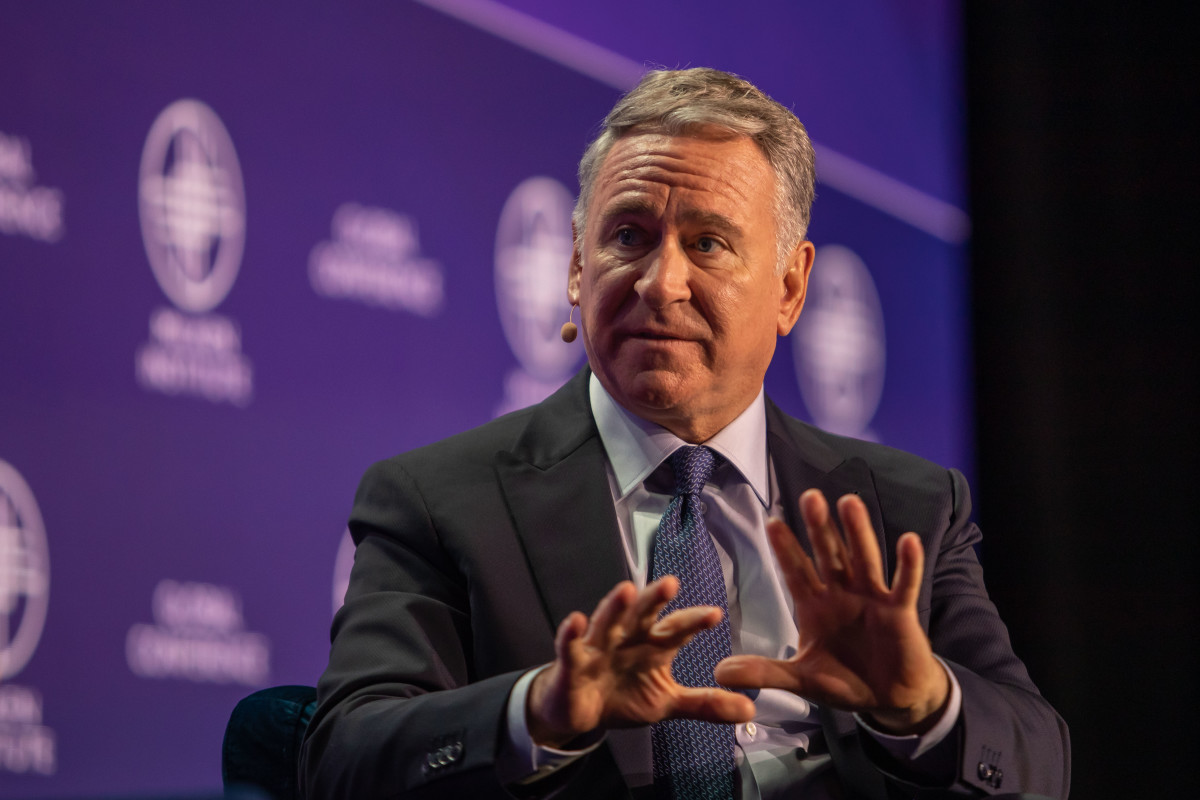
Think of Aesop's Fable. A young shepherd boy falsely cried “Wolf!” to the villagers. Twice, they rushed to help, only to find no danger. But when a real wolf appeared, no one trusted his words anymore.
Citadel's CEO Ken Griffin's comments about Trump’s tariffs sound a lot like the lesson from The Boy Who Cried Wolf.
💰 Stay ahead of the markets: Subscribe to TheStreet's free daily newsletter💸
Citadel is one of the world’s most powerful hedge funds. As of January 1, 2025, Citadel manages approximately $65 billion in investment capital.
Griffin now ranks 36th in the Bloomberg Billionaires Index with a total net worth of $41.8 billion.
"From my vantage point, the bombastic rhetoric, the damage has already been done," Griffin said on Feb.11 at the UBS Financial Services Conference in Florida.
Griffin's remarks came a day after President Trump issued executive orders imposing 25% tariffs on all steel and aluminum imports to the U.S. "without exceptions or exemptions," even for major suppliers like Canada, Mexico, and Brazil.
Related: Morgan Stanley resets interest rate cut forecast after tariff tussle
Before that, Trump signed executive orders imposing 25% tariffs on imports from Canada and Mexico and 10% on goods from China.
After negotiations, the tariffs on Canada and Mexico were deferred, while the duties on China took effect on Feb. 4. Soon after, China announced retaliatory tariffs on select American imports.
Tariffs can be framed as a tool to support domestic manufacturing by making imported goods more expensive, theoretically encouraging consumers and businesses to buy local products,
However, critics like Ken Griffin argue that these policies could backfire, increasing costs for businesses and consumers and making the U.S. a less reliable trade partner.
"It's a huge mistake to resort to this form of rhetoric when you're trying to drive a bargain because ... it tears into the minds of CEOs, policymakers that we can't depend upon America, as our trading partner," the billionaire said.

Tariffs could harm global giants
For multinational companies, tariffs introduce instability that makes long-term planning more difficult.
"It makes it difficult for multinationals, in particular, to think about how to plan for the next five, 10, 15, 20 years, particularly when it comes to long lead time capital investments that could be adversely impacted by a degradation of the current terms of engagement as amongst the leading Western countries when it comes to terms and trade," the hedge fund manager added.
When it comes to tariff risks among corporate giants, Apple (AAPL) could be one of the most exposed.
Related: Analysts reset Apple stock price targets amid earnings, Trump tariffs
That's because a significant portion of Apple's products are assembled in and shipped from China.
During the first Trump administration, Apple received exemptions from the tariffs imposed on Chinese imports. However, several analysts have stated that this probably won't happen this time.
These tariffs could drive up production costs, potentially leaving Apple with the choice of raising prices or absorbing the costs, which would cut into profit margins.
Tesla (TSLA) , though its leader Elon Musk has become Trump's "best friend," is another giant that could suffer from the tariff hit.
Unlike Apple, Tesla doesn't ship China-made models to the United States.
The EV manufacturer sells a significant number of cars in China. Although it has built Gigafactory Shanghai, which opened in early 2020 and allowed Tesla to manufacture cars locally, it still relies on a symbiotic North American supply chain.
In the company’s earnings call in January, Vaibhav Taneja, Tesla’s chief financial officer, warned that the imposition of tariffs "will have an impact on our business and profitability.”
“Over the years we’ve tried to localize our supply chain in every market, but we are still reliant on parts from across the world for all our businesses,” Taneja said.
Analyst said tariffs have "more bark than bite"
Tom Lee, founder and head of research for equity research firm Fundstrat, said last week that the market overreacted to the Trump tariffs and advises investors to “buy the dip.” He had correctly predicted the market rally in 2024.
Lee noted that the tariffs for Mexico and Canada are "probably negotiating tactics around the drug war and tightening the border, and it's been effective."
"[There'd] likely be an overreaction just like DeepSeek," he said, adding that the tariffs "have had more bark than bite, meaning they've proven to be opportunities for investors to buy,” according to CNBC.
Mark Newton, Fundstrat's head of technical strategy, said, “The market’s a lot healthier than many people would think."
More Economic Analysis:
"Technically speaking, the market actually looks quite healthy to me. There’s been no break of any sort of meaningful uptrends,” he said. "This whole fear of tariffs really has not affected the market almost one iota in terms of technical structure.”
Newton's and Lee's comments came before Trump's latest tariffs this week.
Related: Veteran fund manager issues dire S&P 500 warning for 2025







